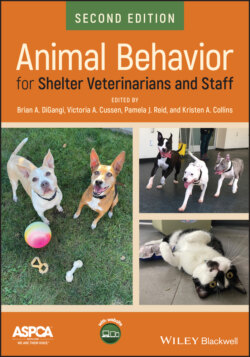Читать книгу Animal Behavior for Shelter Veterinarians and Staff - Группа авторов - Страница 149
4.8.2.3 Testicular Tumors
ОглавлениеTesticular tumors may result in scrotal, inguinal, or abdominal enlargement, depending on the location of the testes. The size of the mass and the location will dictate any behavior changes that occur. Signs may include a stilted gait with the rear legs, difficulty sitting or reluctance to sit, and discomfort lying down. If the tumor is large enough where the testicle touches the ground when sitting or lying, it may become abraded, resulting in excessive licking to the area. Likewise, if the increase in size causes discomfort, excessive licking is a likely consequence.
Sertoli cell tumors are common in older dogs (Weaver 1983) and result in several behavioral and medical changes (Lipowitz et al. 1973). These tumors tend to secrete estrogen, so male dogs will undergo feminization. Externally, changes include mammary development, alopecia, and testicular and penile atrophy. Internally, there may be bone marrow suppression (Sherding et al. 1981). Behaviorally, Sertoli cell tumors are characterized by decreased libido and the compromised bone marrow results in an increase in infections, fever, anemia, weakness, and lethargy. These signs in a supposedly castrated male may indicate that he was a cryptorchid that was not bilaterally castrated.
Interstitial cell tumors and seminomas also affect the testes, although their resultant change in behavior is generally related to the size of the tumor, as described earlier. Excessive licking of the perianal area (due to the development of perianal adenomas) or enlargement of the inguinal area may be associated with hormonal imbalance.
